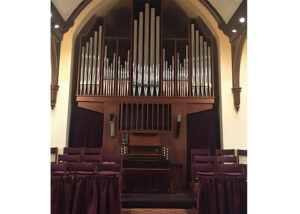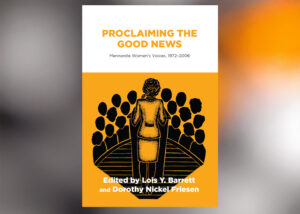With the coronavirus continuing to impact people around the world, Mennonite World Conference (MWC) has called for Anabaptist and Mennonite congregations everywhere to unite in prayer and to exercise precautionary measures in the church.
“Pray for people who are isolated, afraid or ill, especially in Wuhan, Hubei Province and mainland China,” César Garcia, MWC’s general secretary, said in a news release last week. “Pray for wisdom for Chinese governments and health authorities working to contain the outbreak, and for courage, compassion and safety for healthcare workers who work tirelessly to save lives.”
The World Health Organization declared the novel coronavirus outbreak a global health emergency on Jan. 30.
Jeanette Hanson, interim director for Mennonite Church Canada Witness, said that the Chinese church leaders she has spoken with have been heartened knowing that people are praying for them.
“They feel fairly isolated and are very encouraged when they have people reaching out to them,” said Hanson, who also works as the associate director of Mennonite Partners in China (MPC), a program of MC Canada, Mennonite Mission Network and Mennonite Central Committee.
According to The New York Times, at least 150 million people in China—more than 10 percent of the country’s population—are living under government restrictions on how often they can leave their homes.
People are going out only to buy necessities, Hanson said. Food stores and hospitals are the only places that remain open. All schools remain closed after the winter holiday, and churches have stopped services completely.
The school closures impact nine North American English teachers currently serving with MPC, including Canadians Heather Fast and Tobia Veith. These teachers were in Malaysia for a conference over their winter holiday when it became clear that travel back into China was not recommended and that the universities would not be resuming classes on time.
“They are finding places to wait this out,” Hanson said.
None of them will go back into the classroom “until well into March,” she added. Some of them have been asked to teach online classes, but because they mostly teach conversation classes, working online is difficult.
“We’re trying to find ways for them to continue in some kind of service without going back to their cities,” Hanson said.
The internet has become a lifeline during this time, especially for Christians. Churches are posting worship services on their websites, and listeners are posting responses to sermons, chatting about what God is teaching them and asking questions—things that are not commonly done face to face in large churches.
Pastoral care is also happening online as people reach out to their pastors for prayer, counselling and encouragement. Pastors are writing articles encouraging people of faith to face the outbreak of coronavirus with hope.

“Again, the greeting that is so popular among Chinese Christians is ringing out: 以马内利, Yi Ma Nei Li, Emmanuel, God is with us,” Hanson said. Some churches have been reaching out to the people in their communities, providing them with food and masks. “They have been caring for each other in that way.”
Beyond China, there are positive cases of coronavirus in more than 20 countries. The outbreak has not only caused disruption of businesses, school activities and travel, but has also caused panic. In some countries, surgical masks, N95 respirators and hand sanitizers are in short supply due to hoarding. The decline of visitors at tourist attractions, shopping malls, theatres and restaurants is causing economic pressure. Additionally, people with Asian backgrounds may experience racist slurs in other countries.
In its news release last week, MWC called upon congregations to exercise critical thinking and avoid sharing unconfirmed news.
“Fear perpetrated by misinformation about the disease is spreading faster than the virus itself,” said Henk Stenvers, secretary for MWC’s Deacons Commission. “This not only causes unnecessary panic, it also adds a burden of education to an already overworked health system.”
MWC encourages churches to practice the following precautions when illness is circulating:
1. Announce the importance of frequent handwashing with water and soap, especially after toilet visits, before and after eating, and upon contact with someone who is unwell. If passing of germs becomes a serious concern, encourage greeting each other without physical contact, by waving, nodding or bowing to each other.
2. Take temperature prior to leaving the house, especially for children. Anyone with a fever of at least 37.5 Celsius or 99.5 Fahrenheit should rest at home.
3. Wear a surgical mask or N95 respirator should you have a sore throat, cough or runny nose, but need to visit the church.
4. Set aside a first aid room for churchgoers who are found to be unwell during the service.
5. Apply food hygiene policy. Encourage everyone who handles food to wear gloves and mask while cooking and distributing food.
“Jesus told his disciples: ‘Peace I leave with you; my peace I give you…. Do not let your hearts be troubled and do not be afraid,” Garcia said, referring to John 14:27. “Each day, may we remember that God walks with us in the midst of difficult circumstances.”
For more resources on pandemic response, visit bridgesoflove.net/Guide.pdf and commonword.ca/Browse/1155.
Related story:
Coronavirus: MC Canada requests prayer







Leave a Reply
You must be logged in to post a comment.